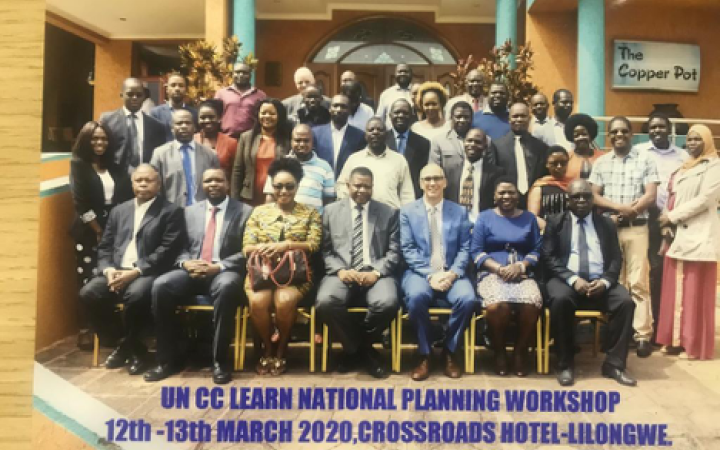On the 12th and 13th of March 2020, the Environmental Affairs Department (EAD) of Malawi, in collaboration with UNDP Malawi and UN CC:Learn, launched the UN CC:Learn project and held the National Planning Workshop. The two-day event built on the experiences from the development and implementation of Malawi’s 2013 National Climate Change Learning strategy with an opportunity to learn from other partner countries and has further strengthened the partnership between Malawi and UN CC:Learn, which dates back to 2012.
The workshop contributed with new ideas for reviewing the 2013 National Climate Change Learning Strategy and served as a means to foment dialogue between key stakeholders in Malawi and other partner countries. Participants from different sectors in Malawi as well as partner country participants from Zambia and Zimbabwe engaged in activities and discussions intended to find out what the new learning priorities are and to take stock of what has already been accomplished including a planning of the project activities. UN CC:Learn regional partner NGO, MIET Africa also participated and shared their inputs and expertise working in the education sector.
On the first day, Ms. Shamiso Najira, Deputy Director of the Environmental Affairs Department and UN CC:Learn Ambassador, laid out the main objectives for Malawi’s current phase:
- Review and update Malawi’s 2013 National Strategy for Climate Change Learning;
- Come up with prioritized list of learning actions for implementation and a resource mobilization strategy to ensure full implementation of the Strategy.
- Identify key priority areas and learning needs in key areas relevant for NDC and NAP implementation.
- Provide support and share experiences with other partner countries in Southern Africa, Zambia and Zimbabwe, to strengthen capacities to implement National Adaptation Plans and Nationally Determined Contributions related policies and programmes.
Several parts of the event were dedicated to experience-sharing presentations. MIET Africa, Zambia and Zimbabwe had the opportunity to speak about their own experiences in developing their own National Climate Change Learning strategies, and update participants on their own project status. One of the highlights was Zambia’s plan to mainstream climate change into national education curricula, while adapting platforms and terminologies to the youth context.
Before wrapping up, participants came up with several suggestions for Malawi going forward, some of which were about capacitating civil servants, public and private school teachers, and professionals working at faith-based organizations on climate change-related issues. Another point raised by participants was the need to translate information materials into vernacular languages, which would enable more students to access them, increasing their reach.
Since its inception, UN CC:Learn has engaged in Climate Change Learning Programmes with developing countries in Africa, Asia and Latin America with a view to strengthening human resources, promoting climate change learning, and developing skills to advance national climate change development agenda in the respective countries.


